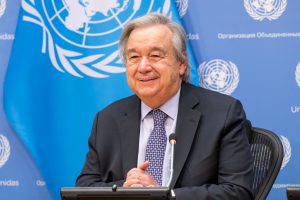Onboard Air Force One, President Donald Trump commented on the relationship between India and Pakistan, stating that the two nations need to work things out themselves. This comes amid rising tensions following a significant attack in the Indian-occupied Jammu and Kashmir, marking one of the worst incidents in nearly twenty years.
While addressing reporters, Trump referenced the long-standing conflicts in the disputed border area and mentioned that he knows the leaders of both countries. However, he didn’t provide a clear answer when asked if he would reach out to them.
In response to a question about the ongoing situation, Trump remarked that the tensions have been around for “1,500 years,” suggesting that the issues are deeply rooted. He expressed confidence that the two nations would eventually find a resolution, saying, “But they’ll get it figured out, one way or the other, I’m sure of that. There’s been great tension between Pakistan and India, but there always has been.”
When pressed about whether he would contact either Prime Minister Shehbaz Sharif or Narendra Modi, Trump stated, “I am very close to India and I’m very close to Pakistan as you know,” and added that the Kashmir dispute has been ongoing “for a thousand years, probably longer than that.”
In a briefing on Thursday, US State Department spokesperson Tammy Bruce addressed the escalating crisis in South Asia.
“It’s a rapidly changing situation, and we’re keeping a close eye on it… At this point, we aren’t taking a stance on the status of Kashmir or Jammu,” she mentioned, noting that was all she had to share on the matter.
United Nations Secretary-General Antonio Guterres also called on both Pakistan and India to exercise “maximum restraint.”

“The secretary-general is clearly following the situation very closely and with significant concern,” his spokesperson, Stephane Dujarric, informed reporters in New York on Thursday.
“We strongly urge both governments to practice maximum restraint and to ensure that the situation and the developments we’ve witnessed do not worsen any further.”
When asked about it, the spokesperson indicated that the UN chief has not had any direct communication with the leaders of India and Pakistan.
Dujarric added, “We believe that any issues between Pakistan and India can and should be resolved peacefully through meaningful dialogue.”
When specifically asked about India’s suspension of the Indus Waters Treaty, Dujarric responded, “I think this falls under our appeal for maximum restraint and avoiding any actions that could escalate tensions in an already sensitive area.”
For the latest updates and insights on new developments, visit the NEWSON
Q1.What did the US President say about India and its neighbor?
The US President emphasized that India and its neighbor need to resolve their longstanding issues independently, expressing optimism that they will eventually “get it figured out.”
Q2.Did the US President offer to mediate between India and the South Asian nation?
No, the US President did not offer to mediate. He stated that he knows the leaders of both nations but did not commit to any direct involvement.
Q3.What is the UN’s position on the India-Pakistan tensions?
The United Nations has urged both India and Pakistan to exercise “maximum restraint” and resolve issues peacefully through meaningful dialogue.
Q4.What role is the US State Department playing?
The US State Department is closely monitoring the situation but has not taken a position regarding the status of Kashmir or Jammu at this time.
Q5.Why is the Kashmir conflict significant?
Kashmir has been a flashpoint between India and its neighbor for decades, with multiple wars and ongoing disputes that deeply impact regional stability.
Q6.Has there been any official communication between the UN and the leaders of India or Pakistan?
As of now, the United Nations Secretary-General has not had any direct communication with the leaders of India or Pakistan regarding the recent escalation but continues to monitor the situation closely.


